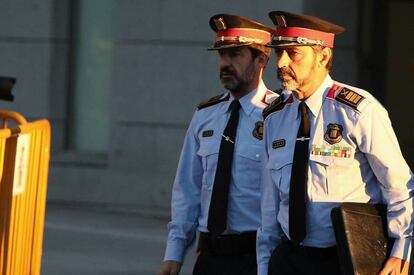Catalan police under investigation for protecting organizers of referendum
High Court judge demands the Mossos d’Esquadra hand over information relating to the separatist vote

The Catalan regional police force, the Mossos d’Esquadra, is being investigated for allegedly providing protection to politicians responsible for organizing the illegal independence referendum that took place in the region on October 1. In a decision issued on Thursday, High Court Judge Carmen Lamela demanded the Mossos hand over records relating to the creation of the so-called “TIC commission,” which was set up for the “security and protection” of regional government members, authorities from other institutions and other public figures.
This record will reveal “who ordered the protection of politicians linked to the preparation of the referendum and how this protection was managed,” according to Lamela’s writ.
The Mossos chief and superintendent are under investigation for sedition
The illegal independence referendum was the pretext for the unilateral declaration of independence passed by the Catalan parliament on October 27. The Spanish government responded by invoking Article 155 of the Spanish Constitution, which stripped Catalonia of its self-rule and gave the central government in Madrid emergency powers.
Lamela has called upon the Mossos to explain if in September and October the so-called TIC commission was tasked with providing security measures to “specific individuals” – including those who were part of a security operation known as Ágora.
The judge has directed her request to the former Mossos chief of police, Josep Lluís Trapero, and superintendent Teresa Laplana. Both police officers are under investigation for sedition. Laplana is being investigated for her role in the protests on September 20 and 21 outside the Barcelona building that houses the Catalan government’s department of economic affairs. The protest involved acts of vandalism against Civil Guard patrol cars, and hindered the work of officers who were inside the building in search of election material to confiscate.
Trapero, meanwhile, has been accused of directing the Mossos to support the independence movement in defiance of orders from the courts.
Judge Lamela has also called on Civil Guard Colonel Diego Pérez de los Cabos, chief of the body tasked by the Spanish Interior Ministry to stop the October 1 referendum, to testify on February 14. During the referendum, efforts by the National Police and Civil Guard to close voting centers ended in confrontations with regional police officers, who refused to follow orders and faced off against the state authorities.
As part of the sedition probe, Judge Lamela has asked the Catalan prosecutor’s office and regional prosecutors to provide copies of all reports and records presented by the Mossos, in accordance with the judicial instructions related to the October 1 referendum. In the decision, Lamela also demanded the Mossos Internal Affairs division hand over information on the investigations into Mossos police officers who defied the Civil Guard and National Police – instances that were captured in numerous videos. Lastly, the judge has asked the Mossos for information on the intervention of former Catalan Interior Minister Joaquim Forn on September 14. In the lead-up to the referendum, Forn said that the Mossos would “ensure the people can vote with freedom and security.” The ousted minister is now serving pre-trial detention for charges of sedition.
Evidence Catalan government spied on PP politicians
The contents of 36 boxes of documents – which the Mossos d'Esquadra were planning to destroy – reveal that "various members of the PP [Popular Party] were put under surveillance and followed by members of the Mossos force." According to documents that have been seen by EL PAÍS, as well as sources close to the investigation, the operation was ordered by officials from the Democratic Convergence of Catalonia (CDC) party. An investigative report says the goal was to collect compromising information about the politicians' "movements, meetings and links in Catalonia," which could then be used as leverage in potential negotiations with the Spanish government over the independence drive.
English version by Melissa Kitson.
Tu suscripción se está usando en otro dispositivo
¿Quieres añadir otro usuario a tu suscripción?
Si continúas leyendo en este dispositivo, no se podrá leer en el otro.
FlechaTu suscripción se está usando en otro dispositivo y solo puedes acceder a EL PAÍS desde un dispositivo a la vez.
Si quieres compartir tu cuenta, cambia tu suscripción a la modalidad Premium, así podrás añadir otro usuario. Cada uno accederá con su propia cuenta de email, lo que os permitirá personalizar vuestra experiencia en EL PAÍS.
¿Tienes una suscripción de empresa? Accede aquí para contratar más cuentas.
En el caso de no saber quién está usando tu cuenta, te recomendamos cambiar tu contraseña aquí.
Si decides continuar compartiendo tu cuenta, este mensaje se mostrará en tu dispositivo y en el de la otra persona que está usando tu cuenta de forma indefinida, afectando a tu experiencia de lectura. Puedes consultar aquí los términos y condiciones de la suscripción digital.








































